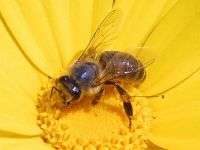Apoidea
| Apoidea | |
|---|---|
 | |
| Apis mellifera, the western honeybee | |
| Scientific classification | |
| Kingdom: | Animalia |
| Phylum: | Arthropoda |
| Class: | Insecta |
| Order: | Hymenoptera |
| Suborder: | Apocrita |
| Superfamily: | Apoidea |
| Subgroups | |
Incertae sedis | |
The superfamily Apoidea is a major group within the Hymenoptera, which includes two traditionally recognized lineages, the "sphecoid" wasps, and the bees. Molecular phylogeny demonstrates that the bees arose from within the Crabronidae, so that grouping is paraphyletic.
Nomenclature
Bees appear in recent classifications to be a specialized lineage of crabronid wasps that switched to the use of pollen and nectar as larval food, rather than insect prey; this makes the Crabronidae a paraphyletic group. Accordingly, bees and sphecoids are now all grouped together in a single superfamily, and the older available name is "Apoidea" rather than "Sphecoidea" (which, like Spheciformes, has been used in the past, but also defined a paraphyletic group and has been abandoned).
As bees (not including their wasp ancestors) are still considered a monophyletic group, they are given a grouping between superfamily and family to unify all bees, Anthophila.[1]
Phylogeny
This cladogram is based on Debevic et al 2012, which used molecular phylogeny to demonstrate that the bees (Anthophila) arose from deep within the Crabronidae, which is therefore paraphyletic. The Heterogynaidae are also broken up.[2] The small subfamily Mellininae was not included in their analysis.
| Apoidea |
| ||||||||||||||||||||||||||||||||||||||||||||||||
| |
References
- ↑ Engel, M.S. (2005). Family-group names for bees (Hymenoptera: Apoidea). American Museum Novitates 3476: 1–33.
- ↑ Debevec, Andrew H.; Cardinal, Sophie; Danforth, Bryan N. (2012). "Identifying the sister group to the bees: a molecular phylogeny of Aculeata with an emphasis on the superfamily Apoidea" (PDF). Zoologica Scripta 41 (5): 527–535. doi:10.1111/j.1463-6409.2012.00549.x.
Further reading
- Grimaldi, D. and Engel, M.S. (2005). Evolution of the Insects. Cambridge University Press. ISBN 0-521-82149-5.
- Michener, C.D. (2000). The Bees of the World. Johns Hopkins University Press.
External links
-
 Media related to Apoidea at Wikimedia Commons
Media related to Apoidea at Wikimedia Commons - All Living Things Images, identification guides, and maps of Apoidea.
- Solitary Bees Popular introduction to the Hymenoptera Apoidea.
- Fiori e Api d'Albore and Intoppa Flower visiting bees in Europe pdf. In Italian but excellent table with Latin names.
- Native Bees of North America
| ||||||||||||||||||||||||||||||||||||||||||||||||||||||||||||||||||||||||||||||||||||||||||||||||||||||||||

